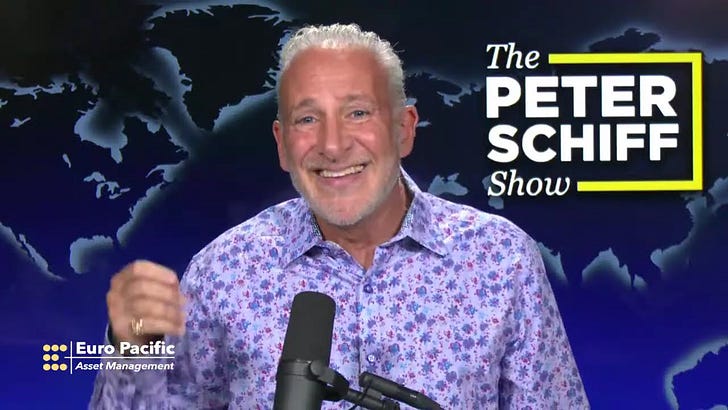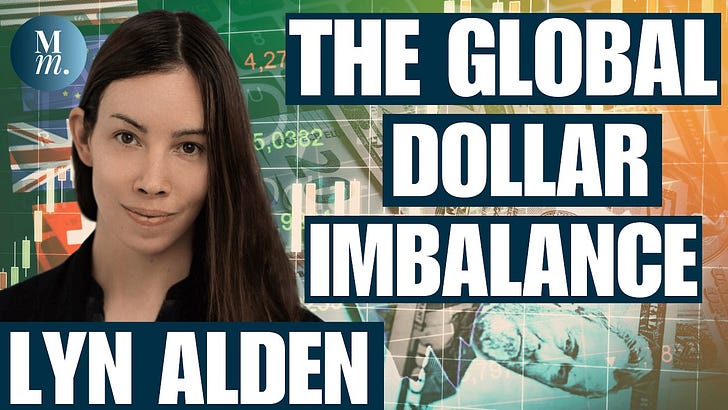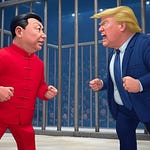Here is another video I found valuable in explaining the current macro financial climate, by none other than Peter Schiff. I leveraged Google’s NotebookLM to summarize the most salient points for my own benefit and am sharing with you all. The summarized audio is 12 minutes compared to the 60 min runtime of Peter’s video.
Here is the original source video:
Briefing Document: Analysis of "The US Already Lost the Trade War - Ep 1021"
Date: October 26, 2023 (based on the provided context of "this week" and holiday mentions) Source: Excerpts from "🔴 The US Already Lost the Trade War - Ep 1021" by Peter Schiff Author: Peter Schiff
Executive Summary:
This podcast episode presents a strong argument that the United States has already lost the trade war initiated by tariffs. Peter Schiff contends that these tariffs, enacted under the guise of "Liberation Day," have backfired, weakening the US dollar, increasing interest rates, and potentially triggering a financial crisis. He argues that the rationale behind the tariffs is flawed, stemming from a misunderstanding of the causes of trade deficits. Schiff believes the recent "pause" on reciprocal tariffs is not a strategic victory but a surrender born out of market panic. He predicts a continued decline in the US dollar and bond market, a rise in gold and gold stocks, and a shift in global economic power away from the US.
Main Themes and Important Ideas:
The Failure of Tariffs and "Liberation Day": Schiff vehemently argues that the Trump administration's tariffs have had the opposite of their intended effect. Instead of strengthening the US economy and reducing trade deficits, they have led to negative consequences. He mocks the "Liberation Day" rhetoric, stating:
"When Trump announced these reciprocal tariffs I mean he was so proud all this fanfare this is Liberation Day hey I got great news for you i'm going to make everything you buy way more expensive right i'm gonna hit you with the biggest tax increase ever but you know he doesn't put it in those terms he's like 'This is great i'm hitting them right america's fighting back we've been screwed over we've been taken advantage of and now you know we're fighting back this is our independence day this is our liberation right it was all BS and and what I said at the time on my podcast is he's liberating us from our standard of living from all of our lowross goods he's liberating us from low interest rates he's liberating us from our stock portfolios and our our equity in those portfolios right all these things I was warning about."
Market Reaction as Proof of Failure: Schiff highlights the dramatic market volatility following the announcement and partial reversal of the tariffs as evidence of their detrimental impact. He notes the initial sell-off, the subsequent relief rally after the "pause," but emphasizes the underlying damage:
"Everybody is talking about how uh nobody thought that the dollar would go down or that bonds would go uh down and rates would go up with tariffs and so everybody was surprised uh by the markets because everybody's been saying uh it's you know counterintuitive well it's only counterintuitive if your intuition is wrong everything that has happened since Liberation Day is exactly what I said would happen before liberation day as a response to the liberation..."
"What got clobbered this week was the US dollar and the US bond market and gold went through the roof to record highs and gold stocks..."
Flawed Rationale for Tariffs and Trade Deficits: Schiff criticizes the Trump administration's understanding of trade deficits, arguing they are a symptom of America's overconsumption and undersaving, not solely the result of other countries "screwing us over."
"Donald Trump looks at our trade deficits and says they're a big problem and they are a big problem but they're not really the problem they are the symptom of the problem it's the problem that's causing these trade deficits..."
"See the reason we have trade deficits in this country is because we live beyond our means we are the problem not China not anybody else it's America we simply spend too much and save too little we borrowed too much we produce too little..."
The "Pause" as a Surrender, Not a Victory: Schiff dismisses the administration's attempt to spin the temporary suspension of reciprocal tariffs as a strategic move to unite the world against China. He sees it as a necessary retreat to prevent further market collapse.
"I think that uh he was persuaded to basically surrender in this part of the trade war and deescalate the trade war because it wasn't a complete surrender but um Trump announced um that he was getting rid of these tariffs now earlier in the day right the market was already down right and he put out a post on Truth Social hey it's a good time to buy don't worry don't sweat it out you should be buying and little did we know he was actually passing out insider information nobody really knew because it was a few hours later that he basically said that you know there's a 90-day pause..."
"If he actually wanted to use tariffs as a negotiation leverage he's lost it he can't negotiate anymore with the threat of tariffs because now the world knows that it's an empty threat he's a paper tiger because if Trump puts back on those high tariffs the markets are going to crash the markets rallied massively because he removed those reciprocal tariffs that aren't even reciprocal so how is he going to put them back who is he fooling right he's exposed himself..."
Consequences: Weakening Dollar, Rising Rates, and Potential Financial Crisis: Schiff predicts significant negative economic consequences, including a continued weakening of the US dollar, rising interest rates, and a potential financial crisis.
"As a result of these tariffs capital didn't come into America capital fled America this has been a global run on US assets..."
"This is going to be worse than the global financial crisis for America it's not going to be a global crisis it's going to be an American crisis..."
"If our interest rates spike and our import costs go up it's going to be a wave of bankruptcies all these retailers are going to go bankrupt because nobody can afford to buy their products they can't borrow the money and the prices are too high anyway and so they default on their on their loans uh now the banks are stuck the banks are going to be all underwater..."
Investment Opportunities in Gold and Foreign Markets: Schiff strongly recommends investing in gold and gold mining stocks as a hedge against the anticipated economic turmoil and dollar devaluation. He also suggests that foreign stock markets will outperform the US.
"Now I am now so convinced that the risk is so minimal in these mining stocks relative to enormous upside see if you've been sitting on the sidelines for the last 20 years and not buying any gold there's no point in now buying it at 3,200 buy the gold stocks because it's like you're buying gold at 1,500 because that's about what they're priced for..."
"What you got to do is recognize everything that I've been saying it's all right even though some of it has took longer than I thought it's all been unleashed it's all happening and it's still early... you want to own those things [foreign stocks and commodities] and demand for gold..."
Shifting Global Power Dynamics: Schiff believes the trade war has accelerated a shift away from US economic dominance, with other countries, particularly China and Europe, potentially benefiting.
"The US has seen a substantial decline in its global position..."
"I actually think the world is going to be liberated that's why I think you know oil prices came down because people were kind of thinking about a global recession it's not going to be global the world is going to be relieved of the burden of supporting the US economy they're not going to have to uh send us all their goods they're not going to have to send us all their capital they're going to keep their goods and they're going to keep their capital..."
The End of Dollar Dominance: Schiff predicts the eventual demise of the US dollar as the global reserve currency, with gold playing a central role in a new monetary order.
"This is the beginning of the unraveling of PAX Americana of this is the end of the exorbitant privilege of the US dollar as the reserve what's going to replace the dollar gold gold is going to be the reserve for all currencies because currencies need to be backed by real money they can't be backed by another currency..."
Quotes Illustrating Key Arguments:
On the market's initial negative reaction: "the markets were down again on Monday and then there was a turnaround Tuesday kind of relief rally everybody was happy because you know the Dow was up like 1500 points... and then the market reversed the Dow closed negative about 300 points so about an 1,800 point decline intraday huge turnaround one of the biggest intraday reversals..."
On the dollar's weakness: "the dollar had one of its worst weeks uh dollar index down 3.3% it's now down 8% on the year but look at the euro the euro rose above um 114 intraday..."
On the flawed logic of tariffs: "you don't injure your adversary with tariffs you injure yourself and that is obvious in the markets we impose these tariffs and the dollar collapsed bonds collapse..."
On the long-term implications: "the whole bubble economy that was built on that foundation is going to come crashing down and the world is going to be withdrawing their capital and so all the returns are going to be abroad..."
Conclusion:
Peter Schiff presents a bearish outlook on the US economy, arguing that the trade war has been a self-inflicted wound. He believes the recent market volatility and the administration's partial reversal of tariffs are confirmations of his long-held predictions. Schiff advises listeners to prepare for a weaker dollar, higher inflation, and potential financial instability by investing in gold, gold stocks, and international markets, positioning themselves to profit from the unwinding of what he sees as a fundamentally unsustainable economic situation.
Study Guide
Key Concepts:
Trade Deficit: The amount by which the cost of a country's imports exceeds the value of its exports.
Tariffs: Taxes imposed by a government on imported goods.
Reciprocal Tariffs: Tariffs imposed by one country in response to tariffs imposed by another country.
Liberation Day: Peter Schiff's sarcastic term for the day the US implemented new tariffs, implying it would liberate Americans from low-cost goods and low interest rates.
Fiscal Policy: Government policy that uses government spending and taxation to influence the economy.
Monetary Policy: Actions undertaken by a central bank to manipulate the money supply and credit conditions to stimulate or restrain economic activity.
Reserve Currency: A currency that is held in significant quantities by governments and institutions as part of their foreign exchange reserves.
Quantitative Easing: A monetary policy in which a central bank purchases longer-term securities from the open market to increase the money supply and encourage lending and investment.
Stagflation: An economic condition characterized by slow economic growth and relatively high unemployment (stagnation) at the same time as rising prices (inflation).
Gold Stocks (Gold Mining Stocks): Shares in companies that are involved in the exploration, development, and mining of gold.
PAX Americana: A period of relative peace in the Western world and later globally, considered to have begun in the mid-20th century, dominated by the United States' economic and military power.
Exorbitant Privilege: The benefit the US dollar has as the world's reserve currency, allowing the US to borrow cheaply and run large trade deficits.
Short-Answer Quiz:
According to Peter Schiff, what was the immediate reaction in the financial markets following the announcement of Trump's reciprocal tariffs?
What did Trump claim was the purpose behind imposing the high tariffs on China after the initial round of retaliations?
What is Peter Schiff's main argument for why the US has significant trade deficits with other countries?
How did Peter Schiff explain the initial positive stock market reaction after Trump announced a "pause" on some tariffs?
What were some of the key market movements observed during the week discussed in the podcast, specifically concerning the US dollar and gold?
According to Schiff, why might foreign countries like China be less inclined to finance US debt in the future?
What does Peter Schiff suggest is the likely long-term consequence of the US losing its "exorbitant privilege" associated with the dollar?
What is Peter Schiff's current investment advice regarding gold, particularly when compared to gold mining stocks?
Explain Peter Schiff's analogy of the five Asians and the American stranded on an island in relation to the global economy.
What does Peter Schiff believe will be the primary asset to replace the US dollar as the world's reserve currency?
Answer Key:
The immediate reaction in the financial markets following the announcement of Trump's reciprocal tariffs was negative, with a sell-off in the markets, a drop in the dollar's value, and a rise in bond yields. This indicated that investors were concerned about the economic implications of the tariffs.
Trump claimed the purpose behind imposing the high tariffs on China was to force China to retaliate, thereby showing the rest of the world that China was the "bad guy" and uniting other nations against them. He also stated this would put the US in a better negotiating position.
Peter Schiff argues that the US has significant trade deficits because Americans spend too much and save too little, leading to excessive borrowing and consumption of imported goods. He believes the problem lies within the US economy, not solely with unfair trade practices by other nations.
Peter Schiff explained that the initial positive stock market reaction after Trump's tariff pause was a relief rally because investors were reacting to the removal of the newly announced "reciprocal" tariffs, even though the underlying 10% tariffs and other trade barriers remained in place.
During the week discussed, the US dollar experienced a significant decline against major currencies like the euro, yen, and Swiss Franc. Simultaneously, the price of gold surged to record highs, and gold mining stocks also saw substantial gains.
According to Schiff, foreign countries might be less inclined to finance US debt because the US has initiated trade policies (tariffs) that harm their ability to sell goods to the US, thus reducing their need to hold US dollars and Treasuries. Additionally, Trump's rhetoric has alienated some allies.
Peter Schiff believes the long-term consequence of the US losing its "exorbitant privilege" will be the end of the "phony prosperity" built on trade deficits, leading to higher prices, higher interest rates, a decline in the dollar's value, and a potential financial crisis in the US.
Peter Schiff's current investment advice is to strongly favor buying gold mining stocks over physical gold. He argues that gold stocks are currently undervalued relative to the price of gold and offer a much greater potential for significant returns.
The analogy illustrates Schiff's view that the US (the American) acts as a consumer, relying on the production of other nations (the five Asians). He argues that the other nations would be better off focusing on their own needs and development rather than primarily serving the consumption of the US.
Peter Schiff believes that gold will ultimately replace the US dollar as the primary reserve asset for all currencies. He argues that currencies need to be backed by real money, and central banks have been accumulating gold in anticipation of this shift.
Essay Format Questions:
Analyze Peter Schiff's arguments regarding the causes and consequences of the US trade deficit. To what extent do you find his analysis compelling, and what alternative perspectives might be considered?
Evaluate Peter Schiff's interpretation of Trump's trade policies, specifically the imposition and subsequent "pause" of tariffs. How does Schiff characterize these actions, and what evidence does he provide to support his claims that the US has "lost the trade war"?
Discuss the potential implications of a declining US dollar and a rising price of gold, as described by Peter Schiff. What are the possible economic consequences for the United States and the global financial system if his predictions come to fruition?
Explain Peter Schiff's investment thesis for gold and gold mining stocks. What are the key factors driving his bullish outlook, and what are some of the potential risks associated with this investment strategy?
Critically examine Peter Schiff's perspective on the future of the global economy and the role of the United States within it. How does he envision the shift away from "PAX Americana" and the US dollar's dominance, and what are the potential winners and losers in this scenario?
Glossary of Key Terms:
Trade Deficit: The negative balance of trade, where a country imports more goods and services than it exports over a specific period.
Tariffs: Taxes imposed by a government on goods or services imported from other countries, often intended to protect domestic industries.
Reciprocal Tariffs: Tariffs that one country imposes on another in response to tariffs already imposed by the latter, often escalating into a trade dispute.
Liberation Day (in this context): Peter Schiff's ironic term for the implementation of tariffs, suggesting it will "liberate" Americans from affordable goods and sound economic principles.
Fiscal Policy: Government use of spending and taxation to influence macroeconomic conditions, including aggregate demand, employment, and inflation.
Monetary Policy: Actions undertaken by a central bank to manipulate the money supply and credit conditions to stimulate or restrain economic activity. Tools include interest rate adjustments and quantitative easing.
Reserve Currency: A foreign currency held in significant quantities by governments and central banks as part of their foreign exchange reserves, often used for international transactions and as a benchmark for other currencies.
Quantitative Easing (QE): A monetary policy tool where a central bank injects liquidity into money markets by purchasing assets without the goal of lowering the policy interest rate.
Stagflation: An economic condition characterized by slow or stagnant economic growth combined with high inflation and unemployment.
Gold Stocks (Gold Mining Stocks): Equities of companies engaged in the exploration, development, and extraction of gold and other precious metals. Their performance is often correlated with, but can be more volatile than, the price of gold itself.
PAX Americana: A Latin phrase describing a period of relative peace and economic prosperity in the Western Hemisphere and later globally, largely attributed to the dominance and influence of the United States following World War II.
Exorbitant Privilege: A term referring to the unique advantages the United States enjoys due to the US dollar's status as the world's primary reserve currency, including the ability to borrow more cheaply and run larger trade deficits.










Share this post